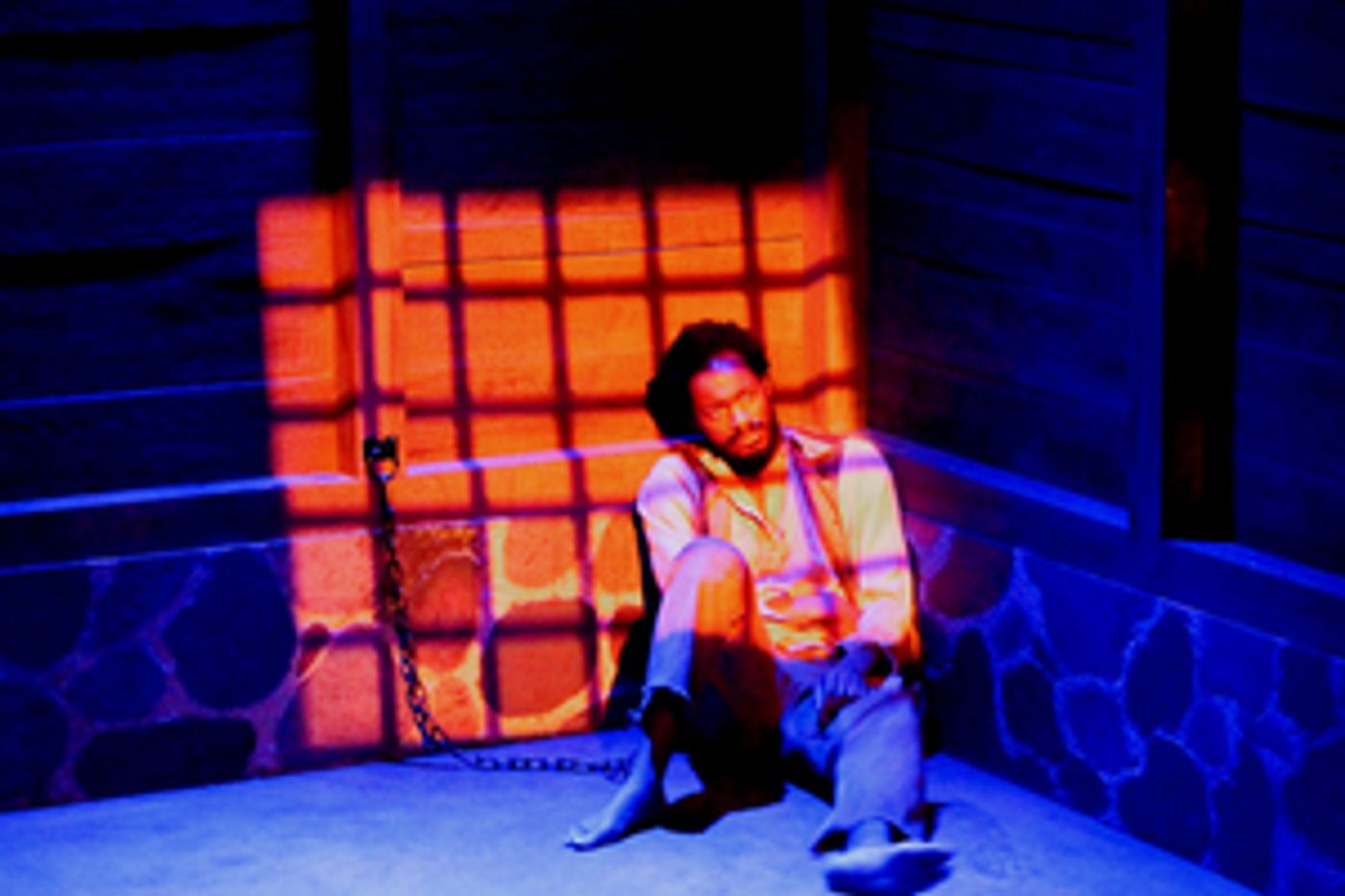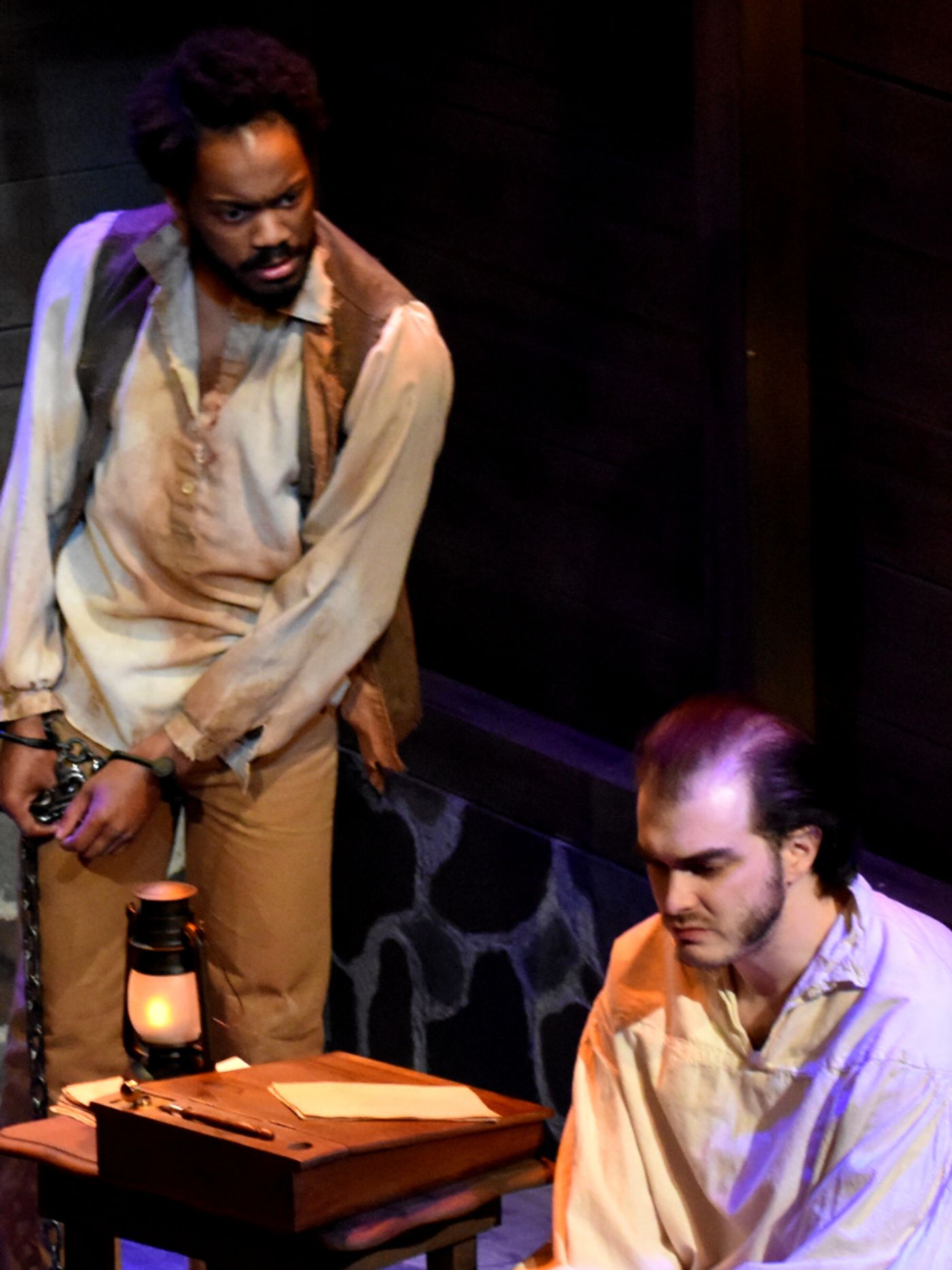Review: NAT TURNER IN JERUSALEM at Next Stop Theatre Company
April 1 through 17

As you enter Next Stop Theatre Company's intimate performance space, anticipating the start of Nat Turner in Jerusalem, you are struck by the stark prison cell that fills the stage, and the Black man huddled in the corner, shackled to the wall. Kevin Thorne's portrayal of the title character grabs the audience, even before the performance begins. Everything about this production is visually rich and engaging.
Nat Turner, convicted of leading a slave uprising that resulted in the murder of scores of men, women, and children, has been sentenced to death by hanging. As the sun sets on November 10th, 1831, Turner contemplates his last night on earth, while his lawyer (and biographer), Thomas Grey (Bobby Libby) attempts to learn if Turner acted alone, or if his murderous spree was part of a larger conspiracy. They discuss, debate and argue through the long night, but ultimately their sparring leaves the audience with more questions than it answers.
Creating a complex, nuanced, layered story that addresses interwoven themes of slavery, religion, racism, oppression, and socioeconomic inequalities is a challenging task, and playwright Nathan Alan Davis made excellent choices about what to include - and what to leave out - in crafting a taut, powerful, and thought provoking script. It's easy to see why the play won the 2020 Kennedy Center Citizen Artist Award.

Nat Turner in Jerusalem.
Davis chooses to unfold the story through a series of one-on-one discussions, primarily between Turner and Grey, interspersed with similar dialogues between Turner and an unnamed jailer (also played by Libby), that serve as a pressure valve when the action becomes too intense. The interactions with Grey focus on the larger issues at play, while the exchanges between prisoner and guard serve to provide a more intimate glimpse into Turner's humanity, providing an important counterpoint to the accepted historical record of Turner's life and legacy.
Scenic Designer Evan Hoffmann's jail cell sets a perfect tone for the action that takes place within its walls. A low stone foundation (that forms all four walls), with rough hewn timbers and wood plank walls, feels like an authentic rural Virginia jail cell, and Hailey LaRoe's spare, straightforward lighting augments that authentic feel - from the sunset amber light that bathes Turner's face in the show's opening scene, to the lamplight (and the first light of dawn) that filters through the gaps in the unfinished, plank walls, as the hours pass.
Hoffman and LaRoe have created a space and a mood that is ideal for the intellectual cage match that takes place there, and director Bryanda Minix has done a wonderful job of leading Thorne and Libby as they navigate the emotional highs and lows of the story. Thorne and Libby have good onstage chemistry and play off each other well. The pacing is excellent, and the crescendos in both volume and intensity are genuine and unforced. Imari Pyles has clothed all three characters in period costumes that accurately portray the backstories of each man.
Both actors acquit themselves well in this production, dealing with difficult subject matter while managing complex subplots and challenging emotional story arcs. Thorne deserves special kudos - his Turner is complex, nuanced and multifaceted, by turns thoughtful and reserved, with sudden flashes of the messianic prophet that hears God telling him to lead an uprising. He finds the right pitch in every scene, and his performance never goes over the top. Including his preshow presence, Thorne is on stage for more than two hours, and he embodies the character of Turner in every moment.
Actors and creative team have combined to create a rich, visually satisfying experience that does what great theatre does best - it allows the audience to ponder the questions the play raises, and look at history in a new light. Davis has done audiences a great service by not trying to answer those questions for us - rather, we're left draw our own conclusions and re-examine our long held beliefs about our shared history.
If there's a criticism of this production, it's that the characters of Grey and the prison guard are meant to played by the same actor. (Based on the publisher's website.) While Libby does a credible job of developing two separate and unique characters, he sports a very distinct set of mutton chop sideburns that impede the suspension of disbelief - it's hard not to think of him as an actor playing two roles. More important, the time it takes for his offstage costume changes cause the play to lag, creating long, uncomfortable silences for Thorne (and the audience). Casting a third actor would improve the pacing and flow of the production; there seems to be no good reason for having the same actor play both parts. One admires Libby's work, but the production would be better served with a another actor.
Nat Turner in Jerusalem is inspiring, and enlightening. It will make you look at the story of this painful moment in our history in a new light, and Next Stop's production comes at a timely point in our own current national dialogue on race, slavery, and the way we frame future discussions of our troubled past.
(Note: The Next Stop website includes the following content warning: "This play includes serious discussions and descriptions about slavery, violence, and murder, including on and against women and children. While no violence is depicted on stage, the complex physical, mental, and emotional repercussions may be triggering for some patrons.")
Running time is approximately 90 minutes, with no intermission.
Nat Turner in Jerusalem runs through April 17th. For more information about Next Stop Theatre Company click here.
Reader Reviews
Videos

